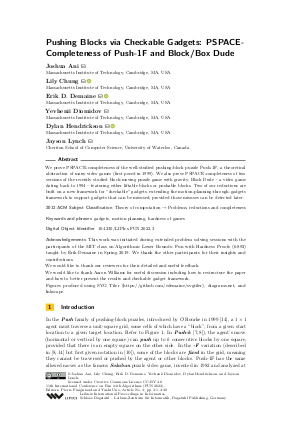LIPIcs.FUN.2022.3.pdf
- Filesize: 1.53 MB
- 30 pages

 Creative Commons Attribution 4.0 International license
Creative Commons Attribution 4.0 International license

We prove PSPACE-completeness of the well-studied pushing-block puzzle Push-1F, a theoretical abstraction of many video games (first posed in 1999). We also prove PSPACE-completeness of two versions of the recently studied block-moving puzzle game with gravity, Block Dude - a video game dating back to 1994 - featuring either liftable blocks or pushable blocks. Two of our reductions are built on a new framework for "checkable" gadgets, extending the motion-planning-through-gadgets framework to support gadgets that can be misused, provided those misuses can be detected later.











Feedback for Dagstuhl Publishing